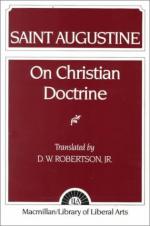
|
| Name: _________________________ | Period: ___________________ |
This quiz consists of 5 multiple choice and 5 short answer questions through Book Two.
Multiple Choice Questions
1. To what does Augustine compare his distinction of things?
(a) To that between human nature and original sin.
(b) To that between instrumental and intrinsic good.
(c) To that between critics who do not understand and critics who believe in "special gifts."
(d) To that between God and Lucifer.
2. Even though Augustine does not mention this subject directly, what will his students need to master to understand languages?
(a) Dialects.
(b) Regional accents.
(c) Grammar.
(d) Metaphors.
3. What doctrine does Augustine introduce to explain how Truth can be seen?
(a) The doctrine of the "inner eye" that can see eternal truths even when tainted by sin because it is illuminated by God.
(b) The doctrine of "special gifts of seeing" that God grants when individuals seek eternal truths illuminated by God.
(c) The doctrine of "community vision" is achieved when individuals join their desires to seek eternal truths illuminated by God.
(d) The doctrine of "things and signs" helps an individual know which things and signs illuminate eternal truths.
4. What are the mix of subjects that Augustine emphasizes in his education?
(a) Rhetoric, philosophy, logic, botany, astronomy, languages and history.
(b) Dietary law, moral law, laws of separation and laws of exclusion.
(c) Mosaic Law, dietary law, Biblical civil law, sacrificial law, and order of the Tabernacle and Temple.
(d) The history of the Pentateuch, the laws of prophets, and the writings of the Minor Prophets.
5. What should be the nature of the relationship between humans and God according to Augustine?
(a) Humans should fear the authority of God over judgment.
(b) Humans should submit to God's authority.
(c) Humans should become like God.
(d) God should be enjoyed by humans.
Short Answer Questions
1. What facts of Scripture does Augustine set as the foundation for understanding it?
2. According to Augustine, how should misunderstood signs become understood?
3. What is the significance of Augustine recommending mastery of so many fields in Book Two?
4. What does Augustine recommend to avoid the negative influences on individual thought?
5. What was the third type of criticism that Augustine suggests "On Christian Doctrine" would face?
|
This section contains 538 words (approx. 2 pages at 300 words per page) |

|




